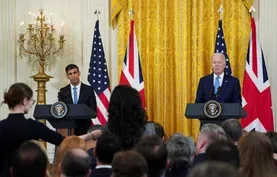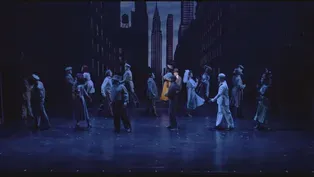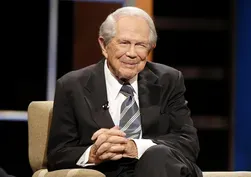
UNICEF leader on the impact wars are having on children
Clip: 6/8/2023 | 7m 31sVideo has Closed Captions
UNICEF leader discusses the devastating impact wars are having on children
A report released by the United Nations Children’s Fund contains an appalling statistic. Each day, 20 children are killed or maimed in conflicts around the world. Thousands more have been abducted, recruited into armed conflicts and subjected to sexual violence in global conflicts over the last two decades. Amna Nawaz discussed the report with UNICEF Executive Director Catherine Russell.
Problems with Closed Captions? Closed Captioning Feedback
Problems with Closed Captions? Closed Captioning Feedback
Major corporate funding for the PBS News Hour is provided by BDO, BNSF, Consumer Cellular, American Cruise Lines, and Raymond James. Funding for the PBS NewsHour Weekend is provided by...

UNICEF leader on the impact wars are having on children
Clip: 6/8/2023 | 7m 31sVideo has Closed Captions
A report released by the United Nations Children’s Fund contains an appalling statistic. Each day, 20 children are killed or maimed in conflicts around the world. Thousands more have been abducted, recruited into armed conflicts and subjected to sexual violence in global conflicts over the last two decades. Amna Nawaz discussed the report with UNICEF Executive Director Catherine Russell.
Problems with Closed Captions? Closed Captioning Feedback
How to Watch PBS News Hour
PBS News Hour is available to stream on pbs.org and the free PBS App, available on iPhone, Apple TV, Android TV, Android smartphones, Amazon Fire TV, Amazon Fire Tablet, Roku, Samsung Smart TV, and Vizio.
Providing Support for PBS.org
Learn Moreabout PBS online sponsorshipAMNA NAWAZ: A new report released by UNICEF, the United Nations Children's Fund, contains an appalling statistic: Each day, 20 children are killed or maimed in conflicts around the world.
That is since they began recording data in 2005.
A staggering 315,000 grave violations against children have been verified by the U.N. Thousands of children have been abducted, recruited into armed conflicts and subjected to sexual violence in global conflicts over the last two decades.
Now, this is a very tough subject.
And a warning: We should say some viewers may be disturbed by some of the details in the conversation I had earlier about this report with UNICEF's executive director, Catherine Russell.
Help us understand the context here.
How do you gather these numbers?
And are these conservative estimates or worst-case scenarios?
CATHERINE RUSSELL, Executive Director, UNICEF: I think you make such a good point, which is, these are quite conservative estimates.
These are cases of -- where we can actually verify what happened, which means we're sure there are many, many more children who are suffering.
And these grave violations are everything from children who are killed, to seriously injured, to abducted, to sexually violated.
I mean, it's just a horrific list of challenges that children face around the world.
And I have to say, our estimates now are, there about 400 million children who are living in some situation of conflict at this -- even today, as we speak.
So it's a staggering problem for children in so many parts of the world.
AMNA NAWAZ: These do stretch over about 20 years that you looked at.
Have these numbers been getting worse over the years, or have they remained steady?
CATHERINE RUSSELL: You know, somehow, the number of conflicts keeps increasing.
The thing that's gotten the most attention than last year has been the conflict in Ukraine.
But the problem is, none of the conflicts ever really seem to go away.
So we're still looking at challenges in Syria, for example, in Yemen.
These places are persistent challenges.
And children -- in every situation of war, children suffer the most.
I mean, that's just the reality that we -- that we have to deal with.
And some of it is direct suffering, where they're injured directly, land mines, attacks, things like that.
In other cases, they suffer because the systems that they rely on, education, health care, water, are destroyed so often in conflict.
AMNA NAWAZ: Catherine, you yourself have traveled to Ukraine and Syria and Yemen.
Tell us about some of the children you have met and what they're facing there.
CATHERINE RUSSELL: You know, the wonderful thing about it is, almost everywhere I go, I see children who just really desperately want to be children.
And you will see them, and they will they will start playing a game or playing tag with each other.
But I have also seen so many horrific situations and heard so many terrible stories.
I remember one.
I was at a hospital in the Democratic Republic of the Congo where they treat children who -- children and women actually who have suffered some sort of violence typically.
And they have something called fistulas, which is a physical problem that results from very vicious rapes.
And I saw one little girl who was so cute.
She was playing.
I assumed that she was a child of one of the women who was there being treated.
And I talked to the doctor there.
And he said, oh, no, she was -- she was a patient.
He had -- he said, it was one of the hardest things he's ever had to do was really put her back together after she had been just viciously sexually violated.
And you have to wonder, why?
How could anyone do that to a 4-year-old baby?
So I have seen that.
I have seen children in Ukraine who are suffering from the after-effects of the -- sort of the -- just the constant shelling.
I met a family where the son was quite disabled, severely disabled.
And every time those sirens would go off, the alarms would go off, he would completely fall apart.
And so the family, because he was -- he was bigger, even though he was sort of childlike, they couldn't get him into the -- into the bomb shelters.
And so, persistently, the family was, like, just trying so hard to protect this child, this son, but also unable to do that, given what was going on.
So I have seen just countless stories like this.
And it is truly -- it's a situation where you see just how horrific human beings can be to each other, and that, when that happens to children, it's just particularly hard to deal with.
AMNA NAWAZ: Catherine, it's unimaginable what you're describing children are enduring around the world.
As part of your report, you project an alarming funding gap as well, a projected shortfall of $835 million in 2024, nearly a billion dollars by 2026.
What is it those funds go towards?
I mean, in the circumstances, how is it you can support these children, short of ending the war or the conflict?
CATHERINE RUSSELL: Yes.
Well, you put your finger on it, right?
First of all, the worst thing that can happen to children is a war.
Children don't start wars.
They are unable to end wars,.
They just suffer in wars.
So, what we do is, in the context of something that's already terrible, which is what children are facing, we try to help put them back together, in a sense, right?
We give them psychosocial support.
Often, we give them physical medical support, if they have suffered, which many children have.
I mean, I saw one child in Yemen who had lost both his legs.
I mean, it was so -- so sad and so painful to see.
So we help on that side.
We also, importantly, try to make sure these children are still getting educated.
A lot of times, in a conflict, as I said, the services aren't happening.
And so children, in addition to being in the middle of a war, are also not getting an education, which sets them back so far.
So, we provide education services.
We provide water.
We provide sanitation, all the basic needs that we possibly can for children.
But, at the end of the day, once they're in that situation, it's already horrible for them, right?
We're just -- we're trying to make the best of a bad situation and trying to help them recover from a situation that they shouldn't have been in, in the first place.
AMNA NAWAZ: With a growing number of children in these situations, if this kind of support is not provided for them, what do you worry will happen for this generation of children?
CATHERINE RUSSELL: Yes.
Well, you can imagine, I mean, I have seen in some situations what happens.
These children just get lost.
They are not getting educated.
They have terrible physical problems.
A lot of times, they end up -- in many places, it's hard for children who are disabled, whether from war or otherwise, but, when they're disabled in war, they -- a lot of times, they don't -- even as the society starts to come together, these children are often not included in schools and other activities.
It's challenging to raise resources for issues like this, because I think, in a way, the world community looks at it, and they think, well, this is just kind of what happens, and it's not -- these conflicts go on for so long that people kind of tire of it.
And I think it is important to remind the world.
And that's why this report is important to say, don't forget these children.
They are blameless here, and they deserve an opportunity to live a decent life.
And we have to do everything we can to help them.
AMNA NAWAZ: As you have said, children shouldn't pay the price for the wars of adults.
That is Catherine Russell, executive director of UNICEF, joining us tonight.
Catherine, thank you so much.
Biden, British PM express continued support for Ukraine
Video has Closed Captions
Clip: 6/8/2023 | 4m 56s | Biden, British Prime Minister Sunak express continued support for Ukraine (4m 56s)
Broadway composer John Kander discusses his latest musical
Video has Closed Captions
Clip: 6/8/2023 | 8m 31s | Broadway composer John Kander on how his latest musical is a love letter to New York (8m 31s)
The cultural and political legacy of Pat Robertson
Video has Closed Captions
Clip: 6/8/2023 | 4m 35s | The cultural and political legacy of Christian broadcaster Pat Robertson (4m 35s)
Life lessons from this year's commencement speakers
Video has Closed Captions
Clip: 6/8/2023 | 4m 3s | The life lessons commencement speakers have given this year's graduates (4m 3s)
Millions warned to stay inside as smoke covers eastern U.S.
Video has Closed Captions
Clip: 6/8/2023 | 4m 15s | Millions of Americans warned to stay inside as wildfire smoke blankets eastern states (4m 15s)
Supreme Court strikes down Alabama's congressional map
Video has Closed Captions
Clip: 6/8/2023 | 6m 30s | Supreme Court rules Alabama's congressional map discriminates against Black voters (6m 30s)
Trump indicted in classified documents investigation
Video has Closed Captions
Clip: 6/8/2023 | 4m 56s | Trump indicted on federal charges in classified documents investigation (4m 56s)
Providing Support for PBS.org
Learn Moreabout PBS online sponsorshipSupport for PBS provided by:
Major corporate funding for the PBS News Hour is provided by BDO, BNSF, Consumer Cellular, American Cruise Lines, and Raymond James. Funding for the PBS NewsHour Weekend is provided by...

















